|
|
|
Sort Order |
|
|
|
Items / Page
|
|
|
|
|
|
|
| Srl | Item |
| 1 |
ID:
120733
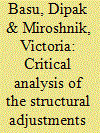

|
|
|
|
|
| Publication |
2013.
|
| Summary/Abstract |
The analysis of the Indian economy, since the structural reform to dismantle the mixed economic planning and to establish market economy, is presented here with clear analysis regarding growth of the macro economy, the real economy and the social impacts in terms of employment. The picture was quite dismal until the short-term portfolio investments from abroad were introduced a few years ago. The recent upsurge of growth is thus the result of these short-term foreign investments.
|
|
|
|
|
|
|
|
|
|
|
|
|
|
|
|
| 2 |
ID:
120731
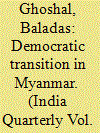

|
|
|
|
|
| Publication |
2013.
|
| Summary/Abstract |
Myanmar, earlier known as Burma, is on the cusp of a transition-a process that has to pass through formidable challenges and whose outcome is still quite uncertain. Five decades of military misrule have turned Myanmar that at one time used to be the richest into the poorest in South-east Asia and in a state of decline with an abysmal record in political, economic and social spheres. To recover from that decline, the country will need good governance, political reconciliation between the government and the opposition, between various ethnic groups and the government and the removal of long years of neglect of their aspirations and empowerment, between those opposition groups that remained within the country and the exiled groups, and finally, the goodwill and support of the international community. Aung San Suu Kyi, Myanmar's democratic leader, has joined the political process and has become the leader of the opposition in the army-dominated parliament. She also faces formidable challenges, as she has to reconcile the wide expectations of people who still consider her as a political activist fighting for the cause and the imperatives of being a constructive politician who has no other option other than pragmatic reconciliation. Relations with China are one issue that will also impinge on future of democracy in the country.
|
|
|
|
|
|
|
|
|
|
|
|
|
|
|
|
| 3 |
ID:
120730
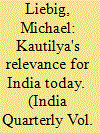

|
|
|
|
|
| Publication |
2013.
|
| Summary/Abstract |
Strange enough, Kautilya's Arthashastra, a classic work of political theory and statecraft, has remained on the sidelines of the political science and strategic discourse not only in the West, but even in India itself. How does modern India relate to Kautilya? We investigate first Nehru's 'special relationship' to Kautilya and then turn to the mainly 'latent presence' of Kautilyan thought among the political, academic and strategic elites of today's India-using Bourdieu's concept of 'habitus'. We also look into the peculiar constellation of social science schools which has tended to inhibit an active, but critical, engagement with Kautilyan thought. Lastly, we show indications pointing an active 're-use' of endogenous politico-cultural resources-including Kautilya-in India. This trend should be seen in the context of India's rise in the multipolar world which also entails the need to articulate a soft power stance based on endogenous politico-cultural resources.
|
|
|
|
|
|
|
|
|
|
|
|
|
|
|
|
| 4 |
ID:
120732
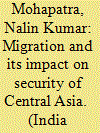

|
|
|
|
|
| Publication |
2013.
|
| Summary/Abstract |
Migration is emerging as an important source of threat to the peace and security of Central Asia. This is happening, notwithstanding the fact that this region is receiving substantial amount of external remittance. Apart from lack of economic opportunities, existence of blurred boundaries, emergence of authoritarian regimes with a tilt towards strong 'ethnic state' as well as the alienation of substantial number of population are contributing to the process of flow of illegal migration. This results in loss of young population, growing ethno-nationalistic conflict, spurt in religious terrorism, proliferation of narco-trafficking as well as HIV/AIDS in this region. These above-mentioned threats are generating a lot of 'insecurity' in Central Asia. The best way to meet the challenges posed by migration is to ensure 'sustainable security' in this region by adopting a broader approach ranging from cooperation among the states of this region so also to ensure human security at the ground level.
|
|
|
|
|
|
|
|
|
|
|
|
|
|
|
|
| 5 |
ID:
120734
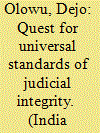

|
|
|
|
|
| Publication |
2013.
|
| Summary/Abstract |
While the Bangalore Principles of Judicial Conduct, 2002, are not binding on states, they evidence high-level support for the principle of judicial integrity. In addition, superior courts and judiciaries of diverse legal traditions have relied on the Bangalore Principles in codifying their minimum standards of judicial integrity. Extrapolating from some of the core values of the Bangalore Principles, this article accentuates some of the critical challenges implicated in establishing credible, independent and accountable judiciaries. Beyond the task of developing appropriate mechanisms for ensuring judicial integrity, this article assesses the follow-up efforts to the Bangalore Principles, such as the draft Lusaka Measures on the Implementation of the Bangalore Principles on Judicial Conduct, 2010, contending that while these measures seek to quantify the critical elements of the Bangalore Principles, there are still areas of concern. This article addresses a plethora of pertinent questions, advocating that the mechanisms for judicial integrity should not be entirely controlled by the judiciary but be made to accommodate sufficient lay representation, and furthermore, that current codes of judicial conduct be formulated as enforceable rules and procedures in ways that would sustain public confidence in judicial processes.
|
|
|
|
|
|
|
|
|
|
|
|
|
|
|
|
|
|
|
|
|